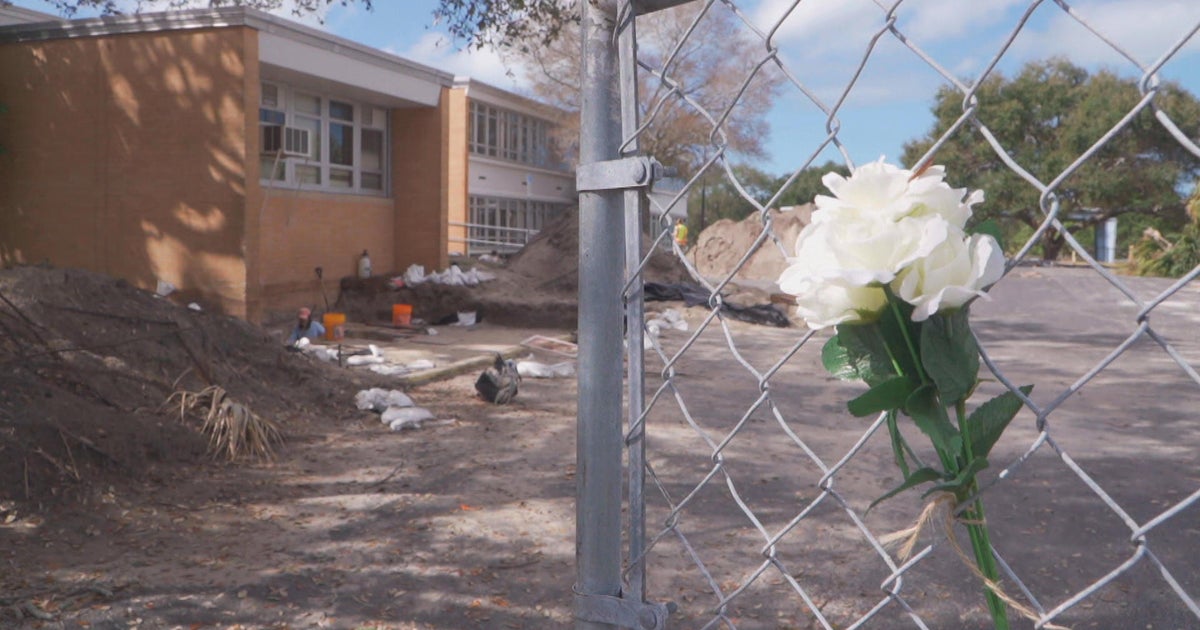60 Minutes of reconciliation for Black cemeteries that have been abandoned

In Clearwater, Florida last century, People were segregated into the grave. These injustices from the past are back.
Archeologists discovered that human remains were emerging from the ground at schools, swimming pools, and office buildings. They also found graves from separate cemeteries, which have been covered up, with their bodies now buried below the development.
A Florida state representative is pushing legislation to fix this problem.
Clearwater’s North Greenwood Cemetery was one of the cemeteries that had been destroyed. It had previously served the Black community until the city moved the graves in mid-1950s. Instead of integrating the white community pool, the city built a school and swimming facility on the land. At the time, it had stated that the city would transport the graves to a nearby cemetery. But, there were dozens more unmarked graves that were not marked and they were only discovered many decades later.
Lois Saylor Bell belonged to one of these graves. She was Bell’s paternal grandmother who had died when he was young. Bell’s father, who had left Florida to find his mother after her death, returned to Florida years later and sought out the grave of his mother. Bell claims that her father discovered that Bell’s mother’s body hadn’t been moved.
Bell hopes that her father, who is now in his 80s, will find an emotional resolution. However, Bell said that the complicated situation was made worse by the fact her grandmother’s final resting spot became a school for Black children.
Bell stated that Bell wanted to give Bell some closure, hopefully before he passes away. “But at the exact same time, this school was where a lot Blacks actually attended. To disturb this would be to disturb the graves once more.”
Diane Stephens, a lifelong resident of Clearwater, grew up close to the former North Greenwood Cemetery. Today, she recalls her childhood watching the negative effects of disturbing the final resting places of their loved ones.
Stephens explained that “when I was smaller, the rain would saturate ground and bones would rise,” he said. “And we would go out there, and my parents would tell us to just leave them there — they’re looking. They are looking for their descendants and a place to rest.
Clearwater’s other abandoned Black cemetery is home to a number of disturbed graves that now lie beneath an office building’s lot. This was the site where St. Matthews Baptist Church, three other churches, established a cemetery to bury the residents of the neighborhood. Clearwater Heights was the name of the neighborhood, with a majority of its residents being Black. Today, the neighborhood is no more.
Clearwater Heights was founded by Carlton Childs Sr. in 1895. His great-grandfather, Carlton Childs Sr., stated that unmarked graves had likely never been moved when the cemetery land sold in the 1950s. It seems that only those who had enough money to purchase a headstone were entitled to dignity in death.
Childs revealed the truth about what happened with his community’s ancestors.
“Who will be honest and open with us about what we can do?” Childs asked. Childs asked, “And who will take responsibility for recognizing the wrongs done to our ancestors and our people and the generations to follow?”
Florida Rep. Fentrice Driskell hopes she can assist with at least some of Childs’ request.
Driskell, who was shocked to discover that Florida had many Black cemeteries in its state, introduced a bill to establish a state agency to assist with the search for these cemeteries.
Driskell’s Abandoned Africa American Cemeteries bill, HB 1215, would have created an Office of Historic Cemeteries that would coordinate all research, restoration and maintenance activities at historic cemeteries. It also requested funding to establish an Abandoned African American Cemeteries Advisory Council.
Driskell’s bill passed with unanimous support in its state House committees, but died in Senate. The congresswoman stated that she intends to reintroduce this bill in a future legislative session.
When asked if she had a message for those she is trying to represent, the people lying in vanishing graveyards, Driskell said she would tell them that their lives mattered — and still have meaning today.
“And even though we cannot change their past, we can try to correct them today by acknowledging what they did wrong and committing our current resources and faculties so that this never happens again.”
Brit McCandless Farmer, Will Croxton and Will Croxton produced the video. Edited by Will Croxton.